Top Gear: A vehicle for controversy?
- Published
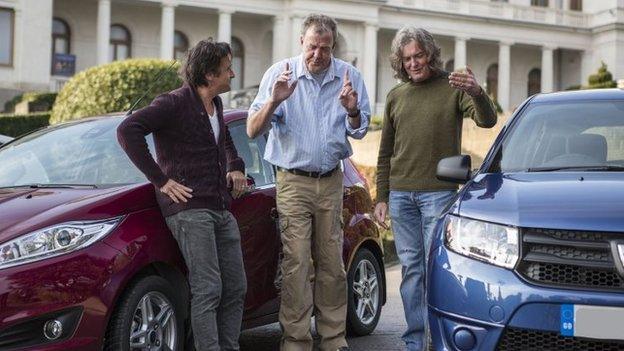
Top Gear presenters (l-r) Richard Hammond, Jeremy Clarkson and James May
Top Gear is one of the BBC's most popular and profitable series, but it has a history of controversy.
The close-to-the-knuckle humour and high-octane stunts are all part of the attraction to the show's 6.5 million viewers.
But it has also landed in hot water for a series of inappropriate comments, misfiring stunts and production errors.
Here are some of the show's more contentious moments.
Accusations of racism
The latest Top Gear controversy has been triggered by Jeremy Clarkson's apparent use of the "n-word" in a clip filmed in 2012.
Although it was never broadcast, the Mirror newspaper got hold of the segment, in which the presenter chooses between different models of car by reciting the schoolyard rhyme Eeny, Meeny, Miny, Moe.
Clarkson mumbles the offensive word, but has since admitted it appears to pass his lips. "I was mortified by this, horrified. It was a word I loathe," he said in a video statement.
The BBC has reprimanded its presenter - but it is not the first time Top Gear has been accused of casual racism.
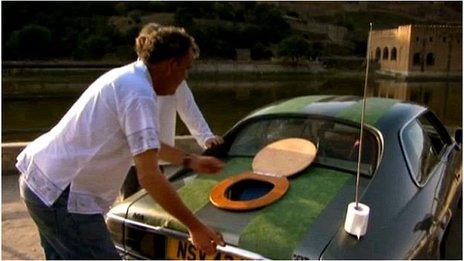
Jeremy Clarkson with his modified Jaguar XJS in 2012's India special
India's High Commission took offence at a special episode, which made jokes about the country's food and culture.
Showing off a customised Jaguar, complete with a toilet in the back seat, Clarkson said: "This is perfect for India because everyone who comes here gets the trots."
An earlier episode caused a similar diplomatic incident in Mexico.
Co-host Richard Hammond said Mexican cars reflected national characteristics - saying they were like a "lazy, feckless, flatulent oaf with a moustache, leaning against a fence asleep, looking at a cactus with a blanket with a hole in the middle on as a coat".
Apologies were also made for an episode broadcast this March, in which Clarkson used the word "slope" as an Asian man crossed a newly built bridge over the River Kwai in Thailand.
Motor industry woes
Top Gear began as a local show on BBC Midlands in 1977, presenting an uncomplicated look at motor cars and road safety issues.
But Clarkson's appointment in 1988 heralded a newly-abrasive reviewing style that could make or break a new car.
It made him the scourge of the motor industry.
The host claimed he would "rather have bird flu" than a Corvette Z06. When he described the Toyota Corolla as "dull", the company banned him from test-driving their cars.
A review of Vauxhall's Mark One Vectra, in which Clarkson remained mute and drummed his fingers on the roof of the car for a full minute, was blamed by some for the closure of the company's plant in Luton.
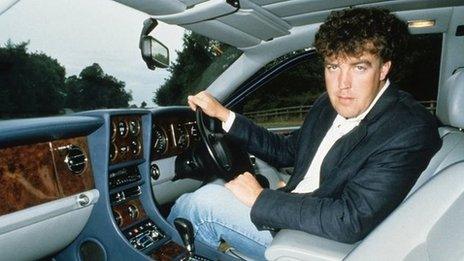
Clarkson has been a mainstay of the show since 1988, apart from a three-year break from 1999 - 2002
In 2008, Tesla tried to sue the show for libel, after Clarkson said its £92,000 electric sports car did not perform as advertised.
"Although Tesla say it will do 200 miles, we worked out that on our track it would run out after just 55 miles," Clarkson said. "And if it does run out, it is not a quick job to charge it up again."
When the case was dismissed, after five years and one appeal, executive producer Andy Wilman said: "I'd also like to apologise to the judges for making them have to watch so much Top Gear."
Angry lorry drivers
Jeremy Clarkson found himself in trouble in 2008, when he compared lorry drivers to murderers.
As he completed a lorry-driving task, Clarkson said: "This is a hard job - and I'm not just saying that to win favour with lorry drivers, it's a hard job.
"Change gear, change gear, change gear, check mirror, murder a prostitute, change gear, change gear, murder. That's a lot of effort in a day."
His comments came shortly after forklift truck driver Steve Wright was jailed for killing five prostitutes in Ipswich.
The BBC received 1,800 complaints, but Ofcom cleared Clarkson of breaking broadcast codes.
"Ofcom did not believe the intention of the comments could be seen to imply that all lorry drivers murder prostitutes, nor would it be reasonable to make such an inference," it said.
"In Ofcom's view, the presenter was clearly using exaggeration to make a joke, albeit not to everyone's taste."
Volkswagen owners
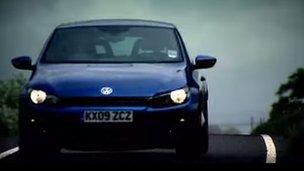
The team were not fans of the Scirocco TDI
At the end of the 13th series, Top Gear's presenters set about creating an advert for the Volkswagen Scirocco TDi, a car they hated because of its diesel engine.
"It's a pretty car but what they've done is put the engine from a canal boat in it," Clarkson said.
The finished advert showed a Volkswagen owner shooting himself in the head because he'd failed to buy diesel.
The BBC argued that the advert, shown before the 21:00 watershed on 2 August, was "ludicrous and obviously comic".
But Ofcom ruled, external the suicide was "graphically depicted", "potentially disturbing" and not editorially justified.
High speed crash
Richard Hammond was almost killed, external in a "catastrophic" crash during filming in 2006.
The presenter was driving at 288mph in a rocket-powered dragster when the front tyre disintegrated and it spun out of control.
He was airlifted to hospital and treated for swelling to the brain and bruising, but eventually made a complete recovery.
"I was driving and then it was two weeks later and I was in Leeds (hospital)," he said after his recovery. "There was a sense of 'oh bugger'."
"In hospital I was completely useless. I'd look at the menu and order my favourite, cottage pie.
"Five minutes later it arrived and I said that's great, it's my favourite, how did you know?"
The Health and Safety Executive said there had been failings in risk assessment procedures but other safety precautions had "almost certainly saved Mr Hammond's life".
Disability charities
Clarkson drew the ire of disability charities in 2010 during a review of the Ferrari F430 Speciale.
Comparing it to a newer model, he said the car "was a bit wrong" and "looked like a simpleton".
He concluded it "should have been called the 430 Speciale Needs".
The National Autistic Society said the comments perpetuated "the prejudice and bullying which people with disabilities have to cope with".
The BBC apologised.
Animal rights campaigners
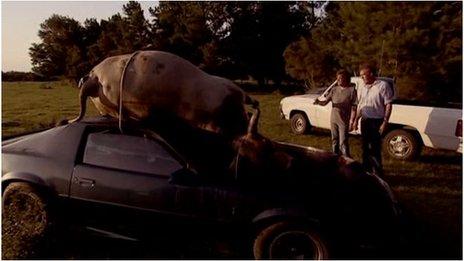
The cow incident was filmed during a US roadtrip
During a US special in 2007, Jeremy Clarkson tied a dead cow to the roof of his Camaro before reversing, flinging the animal into the air.
The segment, which happened when producers challenged the presenters to produce a dinner of roadkill during a road trip, prompted dozens of complaints.
"Viewers are well aware of the type of humour on Top Gear and this was very typical," the BBC said. "However, no offence was intended."
Environmental damage
In 2004, the BBC had to apologise and pay damages, external to a parish council in Somerset after Clarkson rammed a pick-up truck into a mature horse chestnut tree.
He was apparently testing the vehicle's strength at the time.
Environmental campaigners also complained that the presenter had damaged a sensitive peat bog whilst driving a 4x4 to the top of a mountain in Scotland.
A BBC spokesman claimed the test-drive was carried out on private land with the owner's permission and that no damage was caused.
Nonetheless, pressure group Transport 2000 called for the show to be taken off the air and replaced with a programme that promoted "sensible driving in sensible vehicles".
Caravanners
Top Gear's antipathy towards caravan owners is well-documented.
"Caravans are a menace," Clarkson has said. "We all know that.
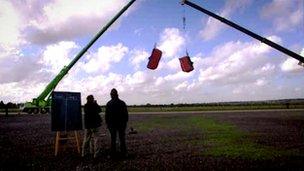
Conkers with caravans
"And the reason for this is very simple. Nobody who tows a caravan has had any training. Which means they're a bit frightened. Which means they drive slowly. And that means they clog up the British countryside all summer long."
His revenge has been both brutal and frequent. Top Gear has burned caravans to the ground, fired them out of a gas-powered cannon and played "conkers" by swinging motor homes towards each other on a crane.
But in 2009, Top Gear bosses admitted setting up a stunt involving a caravan attached to an airship straying over Norwich airport, prompting police to intervene.
At the time, a BBC spokesperson said: "As an entertainment programme, Top Gear prides itself on making silly films that don't pretend to represent real life.
"Any suggestion it deliberately misled viewers is patently ludicrous."
- Published2 May 2014
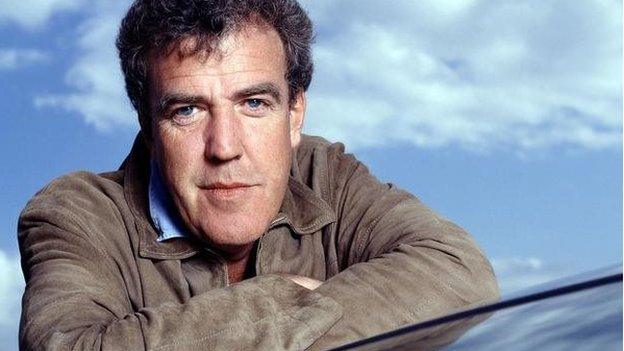
- Published16 April 2014
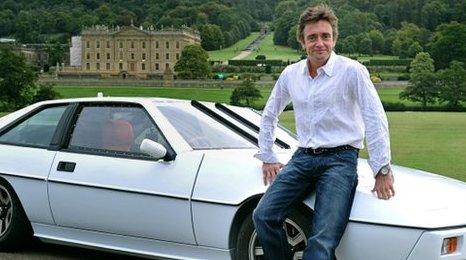
- Published14 March 2012
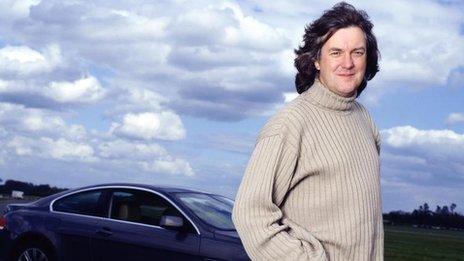
- Published1 October 2012
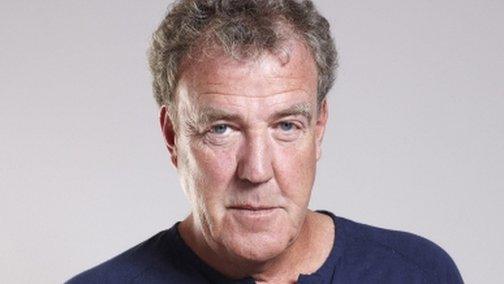
- Published4 February 2011